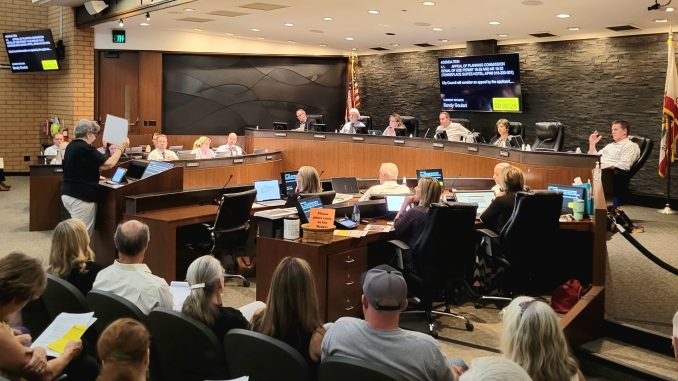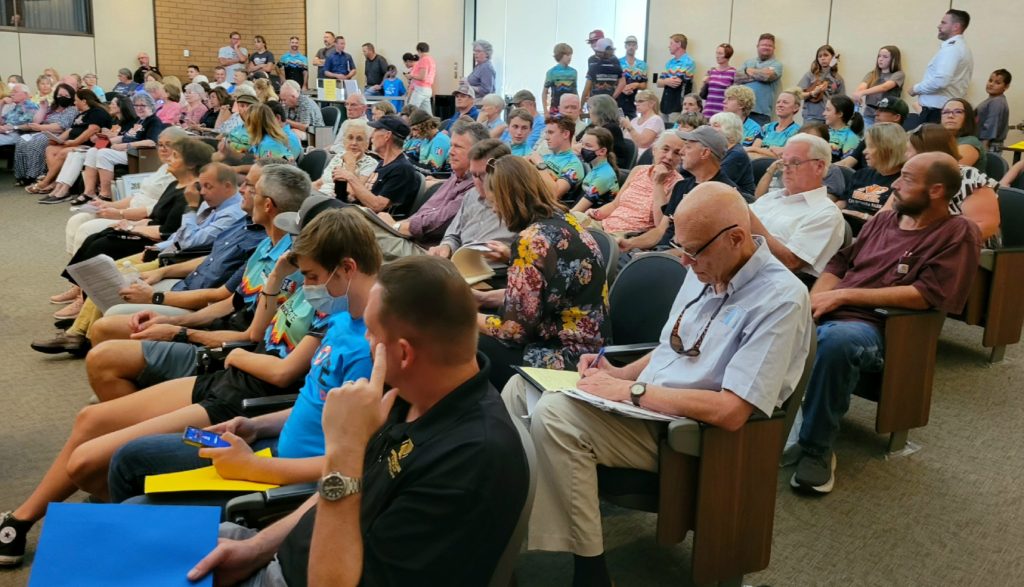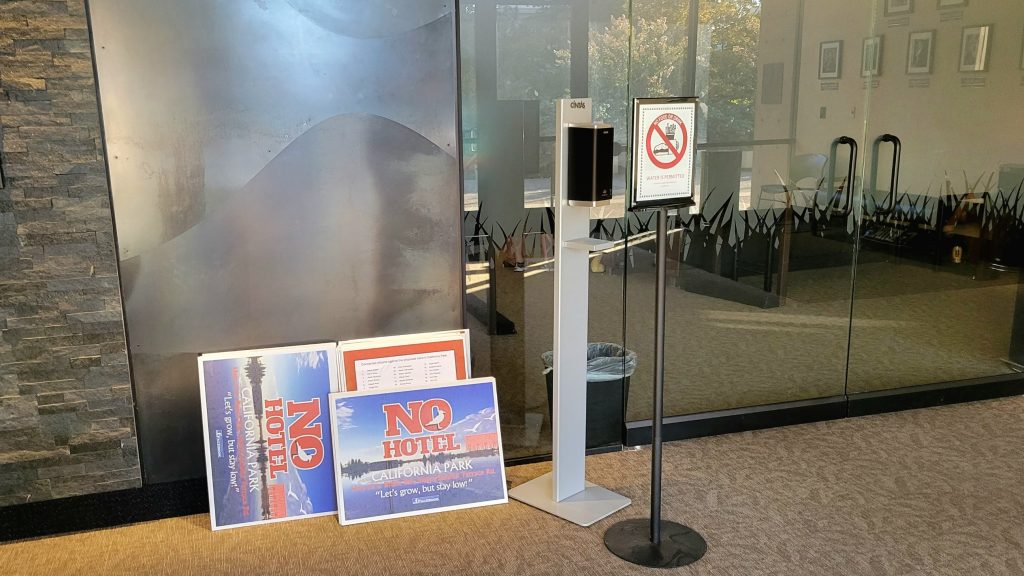
“How could they do that?”
This was the reaction of Sandy Goulart and other California Park residents Tuesday night (Sept. 6) immediately after the Chico City Council, reversing a decision of its Planning Commission, allowed a hotel project in the neighborhood to move forward.
Twenty-two speakers voiced opposition to the proposed TownPlace Suites—a four-story, 112-room Marriott hotel on 4 acres along Sierra Sunrise Terrace at the intersection of Highway 32 and Bruce Road. Their complaints ran the gamut from technical (incompatibility with the general plan) to financial (cost burdens on surrounding homeowners) to logistical (parking and traffic) to visceral (fire-evacuation danger to seniors).
Only Vice Mayor Kasey Reynolds heard enough to support the Planning Commission’s 3-2 vote to deny the project a use permit, but her dissenting vote came after four yes votes had already settled the matter. The ultimate 5-1 vote, with progressive Alex Brown absent, upheld the appeal. The applicants still have two hurdles to clear: a hearing with the Architectural Review and Historic Preservation Board (ARHPB)—subject to a council appeal—and a dispute involving road easements of which the council learned during closed session Tuesday evening.

“How can they just throw out a use permit like that?” Goulart said. “I’m just upset. We had 2[,000], 3,000 citizens [engaged] … this is all pre-planned as far as I’m concerned.”
Martha Ellington, president of the California Park Homeowners Association, said residents and associations in the neighborhood would “reconvene” and discuss their options, which could include litigation. They’ve coalesced into a group, No Hotel California Park, that has fought the project.
“We represent a much wider community,” she said, “and so we want to be able to take it to them. Yes, it can go further, but we’re not making that determination tonight.”
Chico-based engineers Jim Stevens and Mark Wolfe—the latter a former community development director for the city—spoke on behalf of Bakersfield-based applicant Continuum Hospitality LLC. They argued that the project meets the city’s requirements under the general plan and that residents had not made a factual basis for their safety, health and wellness concerns. Use permits, they said, trigger special review of a project with unusual characteristics, potentially additional conditions for approval—but are rarely, if ever, denied.
Councilman Mike O’Brien, a former Chico police chief, drilled down on one of the major issues raised: evacuation of the senior residences and care facilities along Sierra Sunrise Terrace. He asked Fire Chief Steve Standridge and Police Capt. Billy Aldridge (who becomes interim chief Sept. 23 upon Matt Madden’s retirement) whether they had public safety concerns. Aldridge “completely concur[red]” with Standridge’s assessment that a hotel posed no greater risk than anything else that might be built on the property and that the facility would be “prenotified” of an impending wildfire.
Councilman Dale Bennett, who previously served on both the Planning Commission and ARHPB, responded: “I know the California Park residents are adamant in their beliefs … but as of yet, I have not heard concrete evidence or rationale about safety or other elements you have written about.” He made the motion to uphold the appeal, though advocated for keeping architectural review in the process.
Morgan seconded the motion, articulating his support on traffic studies—“almost every other use [that could be approved for that property] is going to be worse”—and an “obligation” to the general plan and zoning that allow such a project there.
Reynolds told the CN&R that, as the at-large council member representing that area under the previous district map, “I really feel for the position where they were coming from. It’s my job to listen to the people, and their arguments were heartfelt.
“I do think there’s definitely some stuff that needs to be worked out on the road; maybe a little worried about liability on the city and where that’s going to fall on more infrastructure where we’re having trouble keeping up on our infrastructure now. Obviously it’s huge for me to hear people’s passion: It’s their home, it’s their life, it’s their neighborhood. But I also was concerned for the city.”

Mayor Andrew Coolidge said the next morning by phone that he “took all aspects into consideration. People who came and spoke had some very good concerns. I just don’t think they outweighed the necessity of what we were doing in terms of how it dipped into the general plan and made sense that way.”
Sewer rates
In the meeting’s other major item, the council voted unanimously to hike sewer rates—and “rip off the band-aid” by doing so all at once rather than incrementally over five years.
Cost for an average single-family residence will jump to $38.34 a month from $22.98. That near-doubling is an estimate, however, because the city is moving from a fully fixed rate structure to incorporate “volumetrics,” or usage, for 30 percent of the charge. (This calculation comes from water used each December through March, to exclude irrigation.) Years two through five also will incorporate rises in the consumer price index.
The council’s Finance Committee had recommended a graduated increase, which (after adjustments since its approval in May) would have started at $29.39 this year and ended at $57.84 in 2026-27. The fifth-year number proved unpalatable, so the conservatives opted for the one-time jump.
“I’m a sewer ratepayer, at my business and personally, and I’d much rather pay $38 a month than $60 a month,” Reynolds said. “To me, that was just math, knowing that once you raise rates, nothing ever comes down.
“I understand it’s about $9 a month more right now in the first year [than the incremental option]—but, boy, that’s a lot easier for me to swallow than having people tripling their rate later down the road.”
Multifamily residential rates actually are set to go down for two years, most notably to $17.59 this year (then to an estimated $22.86 next year). High-volume users in the commercial sector will see the most significant monetary increases.
“The good thing is it will decrease the rate for people living in apartments, some people living in smaller homes; I like that aspect,” Coolidge said. “The real impact to the community isn’t necessarily the $16 increase at homes each month—that’s certainly a factor as everything is getting more and more expensive—but a lot of the increases to be concerned about are to the businesses. I know Kasey, for instance, her rate is going to go up substantially [potentially double at her Shubert’s Ice Cream & Candy shop] because she has one of those businesses that has a lot of water use—you can only sell an ice cream cone for so much.”
Both the mayor and vice mayor pointed to a study compiled by Public Works Director Erik Gustafson that Chico has the lowest sewer rate in the North State and is less than half the Northern California average of $46.81 for a single-family residential connection.
Meanwhile, 30 percent of the wastewater infrastructure is past its service life. The city has $75.3 million in capital needs over the next 20 years and $12 million annually in replacement costs, though the rate increase reflects half the work ($6 million) due to capacity to undertake the projects.
“I’m not thrilled about raising sewer rates,” Coolidge said, “but the fact of the matter is if we don’t, we’re going to have, within a few short years, probably pipes bursting underground—because we’ve had that already, and the age of the pipes and their make-up. That will be a fact. It’s not an ‘if,’ it’s a when.’ So something has to be done.”
Only three residents spoke on the item, with varying degrees of opposition. The city has 45 days to hold a public hearing and protest vote. The new rate takes effect unless a majority of ratepayers object.



Be the first to comment